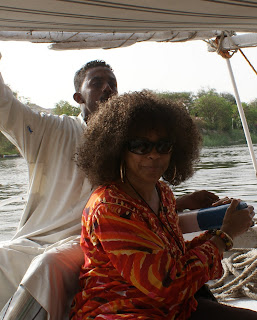We arrived at the school yesterday morning and spent time with our S.I.S.T.A. Scholars, taking photos, exchanging gifts, paying school fees, and making sure we covered any last minute requests for needed items before saying goodbye and boarding the coach for Mole National Park. We had a wonderful time last evening; the welcome celebration was inspiring, emotional and uplifting.
Aminatu took me on a tour of the campus and the classrooms; I was able to see through her eyes, how she lives on the BOGISS campus. Like Aminatu, everything here seems so fragile, so temporary. As I walked around the campus, holding hands with my S.I.S.T.A. Scholar, I was reminded of the lengths that people will go to in order to secure an education. Being from the southern United States and having been born at a time in our history when the education of black folk was not a right, but a blood-soaked, hard fought priviledge, I shuddered just thinking about what we squander and waste in the US. Education is of pivotal importance to these girls, just as it was for young black kids growing up in the southern United States. It is still important, but you wouldn't know it considering how it is taken for granted these days. Although BOGISS is a public school, it is evident that these girls are acutely aware of the priviledge they have been blessed with to attend.
These girls understand how blessed they are to be in school. They represent the sacrifices made by their families. Mothers, fathers, aunties and uncles, grandmothers and whole villages have placed all their hopes on these girls.
I witnessed the girls push over each other to grab a desk and a chair to use in their classes. I was told that the First Year girls had to grab their desks and chairs, for if they didn't they would have to sit on the classroom floor for the entire school year.  BOGISS is not blessed with the most modern technology or the sleekest school facilities. They don't have iPads or cell phone apps or flat screen TV's, laptops or even the most up to date lab supplies. What they have is sad, woefully inadequate, and beyond outdated. Head Mistress explained that the books in the library were from BEFORE Ghana gained its independence! There were reference books and encyclopedias from 1957 on the shelves.
BOGISS is not blessed with the most modern technology or the sleekest school facilities. They don't have iPads or cell phone apps or flat screen TV's, laptops or even the most up to date lab supplies. What they have is sad, woefully inadequate, and beyond outdated. Head Mistress explained that the books in the library were from BEFORE Ghana gained its independence! There were reference books and encyclopedias from 1957 on the shelves.
 BOGISS is not blessed with the most modern technology or the sleekest school facilities. They don't have iPads or cell phone apps or flat screen TV's, laptops or even the most up to date lab supplies. What they have is sad, woefully inadequate, and beyond outdated. Head Mistress explained that the books in the library were from BEFORE Ghana gained its independence! There were reference books and encyclopedias from 1957 on the shelves.
BOGISS is not blessed with the most modern technology or the sleekest school facilities. They don't have iPads or cell phone apps or flat screen TV's, laptops or even the most up to date lab supplies. What they have is sad, woefully inadequate, and beyond outdated. Head Mistress explained that the books in the library were from BEFORE Ghana gained its independence! There were reference books and encyclopedias from 1957 on the shelves. The condition of the library caused all of us great concern. There really was no reason for it to be in this condition, even if the girls were just coming back from vacation. I felt that these rooms were not used at all, but were probably opened up for show for our benefit. The dust was thick, books obviously hadn't been opened and desked hadn't been used in probably years. Pages and pages from books were piled up on the floor as if torn and discarded by some very large, angry child. Something felt very wrong about this. I was very disturbed and very saddened by this scene. The stacks of books on pallets in the photos were current years' school books which were to be distributed to the students when classes resumed.
The chemistry lab and biology classrooms were just as bad. Everything was so outdated and in such a state of disrepair. Again, I had the nagging feeling that these rooms were never used by the students, but were opened up for us visitors. Even in light of the fact that the school had been on winter break, with classes scheduled to starte within a few days of our visit, I find it hard to believe that these classrooms had been used in the recent past.
I was left with a determination to help the girls at this school as much as I can and in any way that I can. We each paid the year's school fees for our S.I.S.T.A. Scholar and were told that the government had taxed an additional $60 CEDES or about $41 USD on to the tuition fees. This additional money was for 'construction improvements'. Aminatu's yearly fees, including the improvement tax was $197 CEDES or about $137 USD.
We were all very quiet as we left BOGISS. A myriad of emotions, thoughts, feelings, observations. The state of the classrooms, the educational environment, the dire need, all weighted heavily on each of us.






























